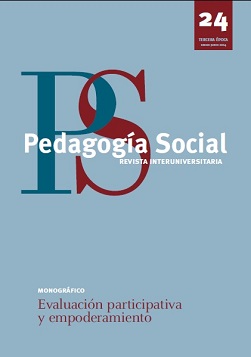Participatory evaluation of community actions as a learning methodology for personal and community empowerment: case studies and empowerment processes
DOI:
https://doi.org/10.7179/PSRI_2014.24.02Keywords:
Evaluation, participatory evaluation, empowerment, community action, learningAbstract
Introduction: Participatory evaluation (PE) is a hybrid methodology that can be used simultaneously to investigate and act in groups and communities. It can generate new knowledge about reality, but it
also allows changes in the participants and their sociocultural context. This research project, developed over three years, aims to find out whether PE processes are useful and appropriate to evaluate community actions
and to generate learning that contribute to the empowerment of people who develop them.
Method: The methodological structure of the research process design Participatory Evaluation processes that are applied in three selected communities-cases, over one year. The steering groups in each case
evaluated four dimensions of Community Development Plans: context, evolution, performance and results, using different techniques and group dynamics. Throughout this process, participants identify the acquired
knowledge and this is linked to indicators of empowerment, using questionnaires, content analysis and semi-structured interviews.
Results: The development PE process in the three analyzed cases confirmed that PE is a useful strategy to assess participatory community actions of a territory; to report them to the people of the community; and
to make shared decisions, about initiatives in order to improve community actions. The obtained results also verify that, throughout PE, there has been learning in the participants.
Conclusions: The involvement of community members in the evaluation makes it more useful, fairer and more valid, but also a fourth positive consequence of PE is empowerment. From the process and the results
of these cases of Participatory Evaluation, we consider that community EP is social transformation.
Downloads
References
Adamson, D. & Bromiley, R. (2008). Community empowerment in practice: Lessons for Communities First. United Kingdom. American Journal of Evaluation. 27(3), 296–319.
Alsop, R., Frost, M. & Holland, J. (2006). Empowerment in practice. From analysis to implementation. Washington: The World Bank.
Coller, X. (2000). Estudio de casos. Cuaderno Nº 30. Madrid: Centro de investigaciones sociológicas (CIS).
Cousins, J.B. & Whitmore, E. (1998). Framing Participatory Evaluation. New Directions for Evaluation, 80, 5–23.
Cullen, A.E., Coryn, C. L. & Rugh, J. (2011). The politics and consequences of including stakeholders in international development evaluation. American Journal of Evaluation, 32(3), 345-361.
Díaz-Puente, J., Cazorla, A. & De Los Ríos, I. (2009). Empowering communities through evaluation: some lessons from rural Spain. Community Development Journal, 44(1), 53-68.
Fetterman, D. & Wandersman, A. (2007). Empowerment evaluation: Yesterday, Today and Tomorrow. American Journal of Evaluation, 28, 179-198.
Generalitat de Catalunya (2008). Plans de Desenvolupament Comunitari. Barcelona: Secretaria d’Acció Ciutadana; Departament de Governació i Administracions Públiques.
Gil, E. Heras P. & Llena, A. (2014). Evaluación participativa y empoderamiento: Análisis documental de investigaciones y prácticas. Dipòsit digital de la UB, pendiente de publicación.
Guba, E.G. & Lincon, Y.S. (1989). Fourth generation of evaluation. Newbury Park. California: Sage Publications.
Kasmel, A. & Tanggaard, P. (2011). Conceptualizing Organizational Domains of Community Empowerment through Empowerment Evaluation in Estonian Communities. Societies, 1, 3-29.
Plottu, B. & Plottu, E. (2009). Approaches to participation in evaluation: some conditions for Implementation. Evaluation, 15, 343-359.
Ronda Ortín, R. (2012). El educador social. Ética y práctica profesional. Pedagogía Social. Revista interuniversitaria,
, 51-63.
Soler, P., Planas, A., Ciraso-Calí, A. & Ribot-Horas, A. (2014). Empoderamiento en la comunidad. El diseño de um sistema abierto de indicadores a partir de procesos de Evaluación Participativa. Pedagogía Social. Revista Interuniversitaria, 24, xx-xx.
Úcar, X., Pineda, P., Núñez, H., & Villaseñor, K. (2011). Pla marc d’Avaluació Participativa dels Plans Comunitaris de Catalunya (2008). Informe de Recerca. Dipòsit digital de documents de la UAB. Recuperado de: http://ddd.uab.cat/pub/estudis/2011/82407/Pla_marc_avaluacio_a2011.pdf
Weaver, L. & Cousins, B. (2004). Unpacking the participatory process. Journal of Multidisciplinary evaluation, 1, 19-40.
Downloads
Additional Files
Published
How to Cite
Issue
Section
License
Copyright (c) 2014 Pedagogia Social. Revista Interuniversitaria

This work is licensed under a Creative Commons Attribution-NonCommercial 3.0 Unported License.
Copyright and right to archive
The published version of the articles can be self-archived by their authors in open access institutional and thematic repositories. However, Pedagogía Social. Revista Interuniversitaria must authorize partial or global reutilisation on new papers or publications.
Published papers must be cited including the title of the journal Pedagogía Social. Revista Interuniversitaria, issue, pages and year of publication
Ethical responsibilities
Pedagogía Social. Revista Interuniversitaria does not accept any material that has been previously published in other documents or publications. Authors are responsible for obtaining the required permissions for partial or global reproduction any material from other publications, and to correctly quote its origin.
Pedagogía Social. Revista Interuniversitaria is obliged to detect and report fraudulent practices.
Only those who have intellectually contribute to the development of the paper must appear as authors.
The journal expects authors to declare any commercial partnership that might entail a conflict of interest with respect to the submitted article.
Authors must mention in the article, preferably in the “methodology” section, that the procedures used during the samplings and controls have been made after getting informed consent.
The journal will not use any received contribution in a way other than the goals described in these guidelines.
Copyright Notice
© Pedagogía Social. Revista Interuniversitaria. Papers published in both the printed and online versions of this Journal are property of Pedagogia Social. Revista Interuniversitaria, being required to cite the source in any partial or total reproduction.
Unless otherwise stated, all content of this electronic journal is distributed under "Creative Commons Attribution-Non commercial 3.0 Spain" (CC-by-nc) license for use and distribution. The informative version and the legal text of this license is available here. This has to be expressly stated in this way when necessary.






